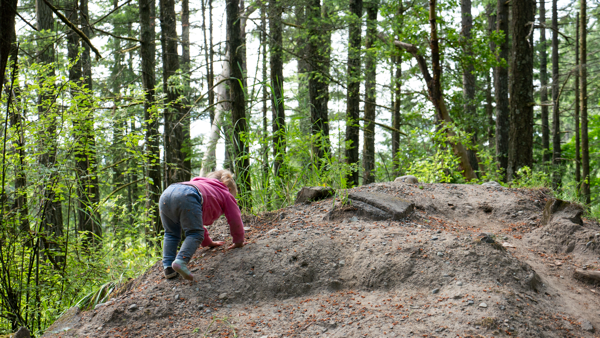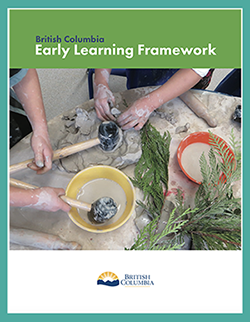
Module 1: The Principles of Early Learning
Land, Culture, Community, and Place
People build connection and reconnection to land, culture, community, and place.
- Children develop a sense of place when they connect with their local communities and the outdoor environment
- Indigenous peoples have been the knowledge keepers of these places for hundreds of generations
- Indigenous languages are some of the voices of these places
- Early learning is “of a place” when children and educators explore local histories with respectful curiosity

The Early Learning Framework explores some new approaches to practice. Some of these can help deepen the relationships children have with place, land, and community.
In B.C., as in the rest of the world, we are faced with many environmental challenges. This includes climate change, waste emissions, and mass species extinction.
As an educator in B.C., you may be faced with these questions
- How do we respond to environmental issues?
- How do we consider our interdependence with the natural world?
- How do we begin discussion about our global responsibilities?
We recognize that we share the world with all creatures, plants, trees, and non-living entities and landforms. We are dependent on each other and these all-world relations.
Children, with their boundless imaginations and sense of adventure, will be leaders and innovators who will both inherit and recreate our societies in the future.
Case Study: Approaching environmental and climate challenges
Educators and children at Brentwood Preschool explore the “Magic Forest” nearby. The children are very interested in a story, previously shared, about ladybugs. They decide to build homes for ladybugs and gather “treasures” from the forest: leaves, sticks, and pinecones. One child sees a crew cutting down a tree, another sees a crane in the sky, another child smells smoke. The group walks by a construction crew cutting down a small tree and the children ask the educators questions. They share their snacks in the sun. Back in the preschool, they display their treasures from the forest and create artwork about what they noticed in the forest. They discuss the environmental impact of construction on the forest.
Reflective Questions
How could you approach the discussion of environmental and climate challenges with the children in your practice?
How could you engage in the process of pedagogical narration?
